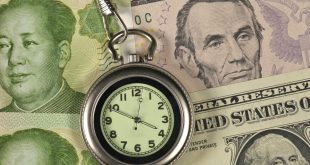Data on Friday showed that the German economy expanded slightly in the third quarter, more than initially expected, supported by consumer spending.
The Federal Statistical Office said Europe’s largest economy grew by 0.4 percent quarterly and 1.3 percent annually, according to seasonally adjusted figures.
Analysts polled by Reuters had expected the economy to grow 0.3 percent in the third quarter and 1.2 percent year on year.
Household spending was the main reason behind the pickup in growth quarterly as consumers travel and increase their activities after almost all pandemic-related restrictions have been lifted.
In the previous quarter, the German economy grew 0.1 percent quarterly.
The government’s latest forecast indicates that the economy will grow by 1.4 percent this year and decline by 0.4 percent next year.
A spokesman for the Economy Ministry said current indications still pointed to a recession in the six months to March.
European retailers hope Black Friday sales will encourage shoppers to spend even though this season comes amid a deepening cost-of-living crisis and the World Cup soccer season.
Shops and stores across Europe fear that sales during the Christmas season, in general, will be the worst in at least a decade, with shoppers reluctant to spend, while the cost of operating activities and businesses will increase without any indication that they may decline, shrinking profit margins.
Double-digit inflation has eroded consumers’ purchasing power and their confidence is at or near an all-time low, as rising energy bills exacerbate the rising cost of living.
Consumers started their Christmas shopping early this year to put their financial affairs in order while many are still waiting to shop on Black Friday.
But some consumers may have other priorities, with Wales, England, the Netherlands and Poland playing matches on Black Friday at the World Cup.
Europe
The Stoxx 600 index of European stocks closed flat on Friday, achieving gains for the sixth week in a row, as hopes of a slower pace of interest rate hikes offset a broad sell-off in real estate stocks, while retail companies were affected by fears of a mixed holiday shopping season.
The European index hit its highest level in more than three months earlier in the week.
The European retail index fell 0.6 percent on Black Friday, which marks the start of the shopping season, on the back of a worsening cost-of-living crisis and a shift in attention to the soccer World Cup. The index is among the worst-performing sectors in Europe, down 32 percent for the year so far.
The real estate index fell 0.9 percent, after leading the market up in the previous session. British housing stocks led the decline after a survey showed demand for home rentals rose in Britain in October, with potential first-time buyers postponing purchases.
However, the Stoxx 600 index rose 1.7 percent this week, indicating that the Federal Reserve (the US central bank) may slow the pace of raising interest rates, and after better-than-expected business results for the season.
Credit Suisse shares fell 6.6 percent to a record low in the wake of announcing plans to raise capital and after a report released this week showed weak results.
Rockwool rose 4 percent after Morgan Stanley raised its target price for the Danish company.
Elia Group shares rose 4% after the Belgian electricity grid operator raised its forecast for 2022 and announced a five-year capital spending plan.
Nasdaq
The Nasdaq closed lower on Friday, weighed down by a decline in Apple Inc. stock in a quiet trading session on Wall Street due to a holiday, as investors awaited Black Friday sales and COVID-19 infections in China.
Apple shares fell 2% after news that iPhone shipments from a Foxconn factory in China fell in November as Covid-related labor unrest hit production.
Attention focused during the session on retail companies as the Black Friday sales season kicks off against stubborn hyperinflation and slowing economic growth.
Shoppers were expected to flock to stores in record numbers to snap up Black Friday deals, but numbers outside stores were thin on the busiest shopping day of the year, due to cooler weather.
US retail stocks have become a barometer of consumer confidence amid the onslaught of inflation. The Standard & Poor’s 500 index of retail companies has fallen just over 30 percent since the start of the year, while the Standard & Poor’s 500 index is down 15 percent.
Asia
Large Chinese industrial companies witnessed a further decline in gross profit between January and October as the spread of COVID-19 increased and cities imposed new restrictions to combat the virus, including closures in certain places, which negatively affected economic activities.
Data from the Office for National Statistics released on Sunday showed industrial profits fell 3% in the first 10 months of 2022 on an annual basis, compared with a 2.3% decline in the January-September period.
The statistics bureau has not released figures for each month independently since July. Profits fell in 22 out of 41 large industrial sectors in China.
Oil
Oil prices fell 2 percent on Friday as liquidity in the market declined, at the end of a week marred by concern about Chinese demand and controversy over the West setting a ceiling on the price of Russian crude.
Brent crude futures fell $1.71, or two percent, to settle at $83.63 a barrel, giving up early gains.
US West Texas Intermediate crude futures fell $1.66, or 2.1 percent, to $76.28 a barrel. There was no settlement of WTI contracts on Thursday due to the Thanksgiving holiday in the United States and trading volumes remained low.
“Because volume is thin after the holiday, we gave up some of the gains here to some extent,” said Phil Flynn, analyst at Price Futures Group.
Both contracts recorded their third consecutive weekly decline, after reaching their lowest levels in ten months this week. Brent ended the week down 4.6 percent, while WTI fell 4.7 percent.
On Friday, China, the world’s largest oil importer, announced a new record high number of daily COVID-19 infections as the country’s cities continued to impose movement bans and other restrictions to control the outbreak.
On the other hand, diplomats from the Group of Seven countries and the European Union are discussing imposing a price ceiling on Russian oil between 65 and 70 dollars a barrel, but no agreement has yet been reached. European diplomats said a meeting of EU government representatives scheduled for Friday evening to discuss the proposal had been cancelled.
Gold and Metals
Gold prices stabilized below the highest level in a week, which it recorded earlier on Friday, with the rise of the dollar. Still, expectations of a less sharp increase in interest rates from the Federal Reserve put the yellow metal on the path to achieving a small weekly gain. Prices achieved a session high of $1,761.17 an ounce earlier.
US gold futures recorded a settlement up 0.5 percent to $1,754.
The dollar index rose 0.2 percent, making it more expensive for overseas buyers to hold dollar-denominated gold.
China, the world’s largest gold consumer, on Friday set a new record high for COVID-19 infections, and cities across the country continued to impose restrictions to control the outbreak.
Minutes of the November 1-2 meeting on Wednesday showed that a “significant majority” of Fed policymakers agreed that it “would soon be appropriate” to slow the pace of interest rate hikes.
Gold is a hedge against inflation, but high-interest rates discourage investment in the precious metal, which does not yield a return.
Silver was a little changed, recording $21.52. Platinum fell 0.7 percent to $980.71 an ounce. Palladium fell 1.4 percent, recording $ 1,854.47, and is on its way to recording a weekly loss.
 Noor Trends News, Technical Analysis, Educational Tools and Recommendations
Noor Trends News, Technical Analysis, Educational Tools and Recommendations





